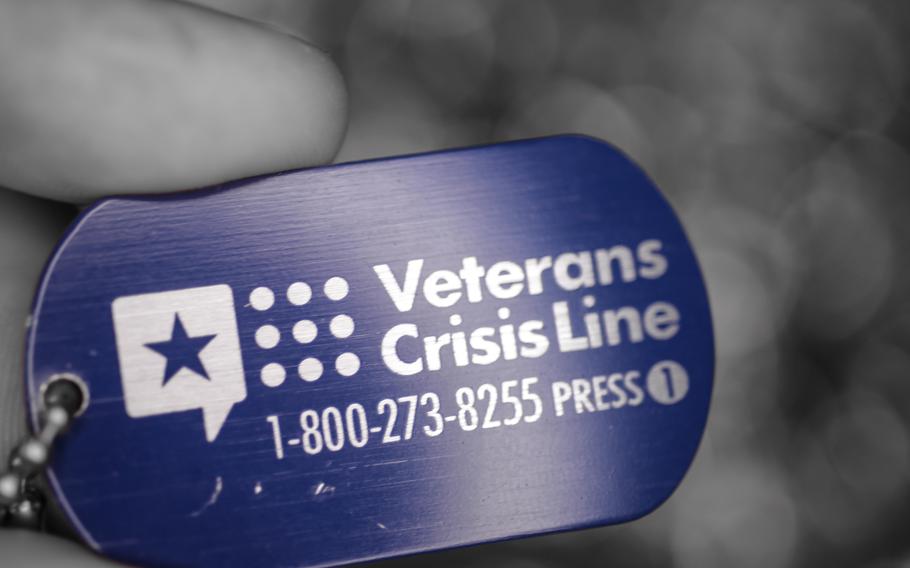MARION, Ill. (Tribune News Service) — For the veteran contemplating suicide, the decision to end one’s life may be made before half-time of a football game. During that time, veterans are statistically less likely to commit suicide if they encounter a Veterans Health Administration official before committing the act. For the Marion VA Medical Center, that isn’t just a statistical abstraction, but a reality healthcare officials deal with daily.
Local Navy veteran Joshua Inkenbrandt was within that critical hour and contemplating suicide when he decided to reach out for help. His plea was immediately responded to by Erin Minnette, the Marion VA Medical Suicide Prevention Coordinator, who returned his call within minutes.
“The veteran was having problems at home and felt like he was out of options. I was able to keep him on the phone until a police unit arrived at his house to take him to a local facility for help,” Minnette said.
Phone calls like that are the real “life lines” when what’s at stake is not a million dollars, but a million memories one will never have and share with their family.
More and more veterans are choosing the wrong answer. Suicide is on the rise, and veterans are 1.5 times as likely to commit suicide than the rest of the nation’s population. Unlike many other maladies that are treatable, suicide is difficult because there are so many factors involved.
“I don’t think there is a single reason that a person chooses to die by suicide,” said Marion Medical Center Program Manager, Crisis Services Dale Horaz, who leads the suicide prevention team at Marion. “In most cases, suicidal thoughts are caused by an underlying treatable disorder, increased risk factors, and a build-up of stressors. Treatable is the key word which makes suicide 100% preventable if a person reaches out to get the care that they need. Most that choose suicide feel that death is their best option due to the physical and/or psychological pain they are experiencing, which to me is sad to think that anyone feels that way.”
Thankfully, Inkenbrandt did not believe that death was his best option.
“Sometimes you get to a point where you feel like there is only one option. I want to say that there is always more than one option. If you feel like you can’t find that, then reach out, because someone like Erin will be there willing to help you out,” said Inkenbrandt.
Veterans are more at risk for suicide compared to the general population due to various stressors and increased risk factors, Horaz said, citing many factors which may contribute to suicidal tendencies. Making the move from military to civilian, societal dysphoria and isolation, combat related stressors, financial difficulties, physiological, psychological, and social problems are some of the many factors that could cause suicidal thoughts.
But thankfully for Southern Illinoisans and veterans across the nation, people like Horaz and Minnette are there to help.
“My team provides support, monitoring, and intensive case management services for veterans identified as high risk for suicide. Our contacts with these Veterans include phone calls, face-to-face, and video sessions, depending on the situation. We develop safety plans, discuss means restrictions, and offer hope to those veterans. Most of these veterans are established in Behavioral Health Services, but if not, my team will assist in getting the individual linked with Behavioral Health care. My team also follows-up with all local calls placed to the Veterans Crisis Line, provides in-services and outreach presentations and trainings, and educates providers at all levels on suicide screens and means restriction efforts,” Horaz said.
And, because of their tireless assistance and support, veterans are grateful at having another chance at life.
“Because of your help, my daughter will have a father to guide her, protect her, and to lean on when life gets hard. My son will have an example of how to express himself in a world that thinks men shouldn’t feel. You have helped my two favorite people in the entire world: earning yourself a top spot in the process! Thank you, Erin. Thank you for being at work that day. Thank you for staying on the phone with me while I waited for the EPD to arrive. Thank you for shifting my focus and keeping me calm and rational. You truly are a hero,” said Inkenbrandt in a letter of gratitude to Minnette, who added that he hoped she knew how valuable she was to veterans as a suicide prevention coordinator.
Whatever the factors are that drive veterans to contemplate suicide, there is help at the VA. In addition to the crisis intervention services, there is a whole host of other services the VA offers which can turn the veterans life around.
“We want veterans to know that there is help for them. Besides Suicide Prevention, VA offers numerous Behavioral Health programs including Outpatient and Group Therapy, Medication Management, PTSD, Addictions/Substance Use, Homeless/ HUD VASH, Military Sexual Trauma, LGBTQ+, Employment Programs, Veterans Justice Outreach, Residential Rehabilitation Treatment Program, Veteran Peer Support, and Primary Care Mental Health,” said Horaz.
If you are a veteran who struggles with thoughts of suicide, take a pen and paper and jot this number down and put it on your refrigerator. It may just save your life some day.
Veterans Crisis Line: Phone 988 (Press 1) or 800-273-8255 (Press 1), chat: VeteransCrisisLine.net, or text: 838255
robert.robbins@thesouthern.com
(c)2023 The Southern Illinoisan, Ill.
Visit at www.thesouthern.com
Distributed by Tribune Content Agency, LLC.

(Photo illustration by Zachary Hada/U.S. Air Force)